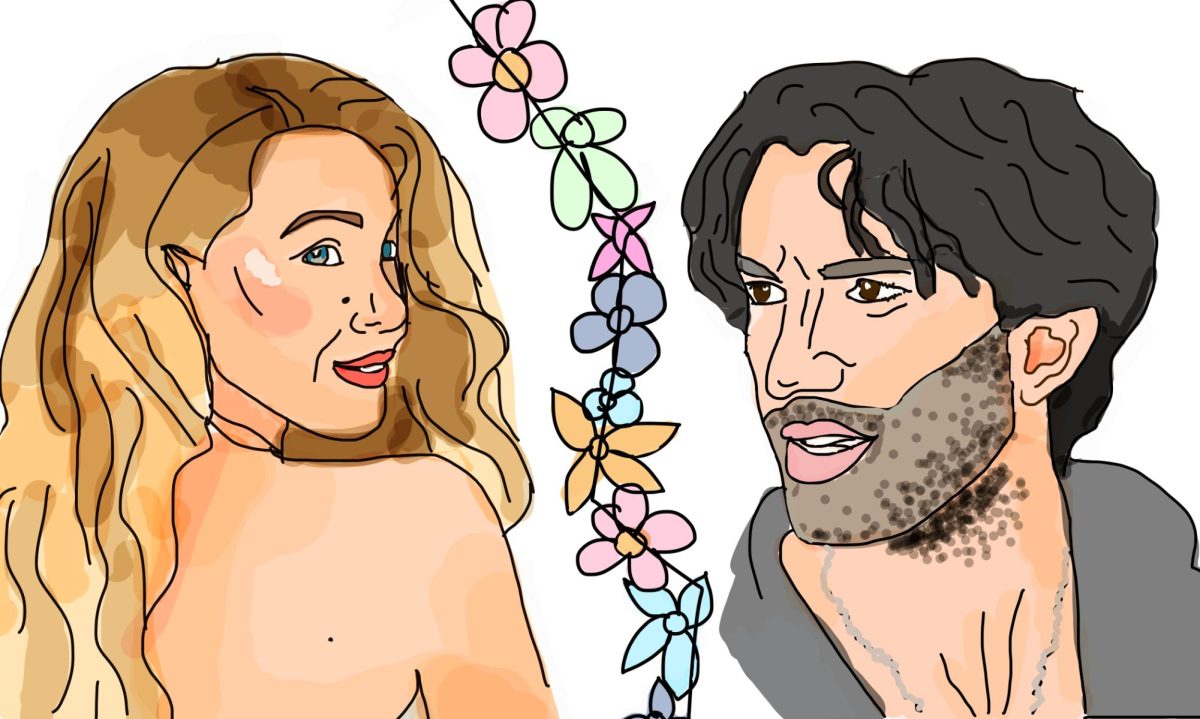This past fall, the eagerly anticipated movie adaptation of Colleen Hoover’s best-selling novel, It Ends With Us, was released to the public. While fans were thrilled and ready to see the heart-throbbing novel come to life, nothing could have prepared them for what the movie really became most known for: scandals, lawsuits, and a hot-blooded rivalry between two seething cast members.
The movie, released on August 9th of 2024, is centered on the story of Lily Bloom, played by Blake Lively, as she navigates her abusive relationship with the male lead, Ryle Kincaid, portrayed by Justin Baldoni. With both actors well-respected in the film industry, fans looked forward to seeing a noteworthy film that sheds light on domestic violence.
However, the public’s focus on the movie began to shift in early August during the film’s promotion tour, when fans noticed that Baldoni was never present in interviews with the rest of the cast. The speculated feud between the actors only heightened when fans saw the actors didn’t follow each other on Instagram, which was considered striking as Lively and Baldoni had been following the rest of the cast at the time.
Two days after the premiere, The Hollywood Reporters were informed by sources that there had been production disputes between Baldoni, the film’s executive producer, and Lively, the co-producer.
“Social media users also began speculating that Lively brought in her husband, Ryan Reynolds, to help take over creative control of the film…Lively, however, did have a strong say in the film’s creative direction as she was also a producer on the feature on top of being its star. That seemed to extend to having the power to make her own version of the movie.”
What may have begun as a trivial discourse on set soon progressed into a heated altercation between Lively and Baldoni as the public made it clear who they sided with. As the press tour for the movie continued, Lively’s reputation plummeted.
The criticism of Lively began to grow when an interview released on August 10th titled “The Blake Lively Interview That Made Me Want to Quit My Job” resurfaced. In it, interviewer Kjersti Flaa congratulated Lively on her baby bump, to, which Lively, who had publicly announced that she was pregnant before the interview, responded ‘Congratulations on your little bump’ and proceeded to ignore Flaa during the following portion of the interview that regarded Lively’s wardrobe on set.
“The “talking amongst yourselves as if the interviewer isn’t even there?… That is some rude, mean girl behavior” a commenter on Flaa’s video said.
After that interview, several more old interviews depicting Lively as a ‘mean girl’ began to materialize, and the public’s distaste of Lively grew rapidly.
“I’ll never see Blake Lively the same way again,” another person commented under an old Lively interview.
Lively faced even more backlash during the movie’s press tour when she was criticized for not speaking about the movie’s portrayal of domestic violence and instead treating the film as a lighthearted adaptation.
“It Ends With Us is in theaters now! So grab your friends, wear your florals, and head out to see it,” Lively said in a promotional video released by the It Ends With Us social media page and thus encountered retaliation for not taking the film’s message seriously.
“This is how Blake Lively is promoting her movie about escaping an abusive relationship and breaking the cycle of the abuse. Unhinged and tone deaf,” a critic wrote to Yahoo News.
The claim that Lively failed to address the movie’s message prospered during an It Ends With Us after-party when Lively promoted her alcoholic beverage company by announcing her drink titled “Ryle You Wait”.
“Lively named a cocktail after the abuser [Ryle in the film] … so it’s just one insensitive thing after another… She had so many opportunities, and she still does have an opportunity now, to make an apology and try to make things better,” Jjanga Weir, a domestic violence survivor told NBC News.
Fans found it hard not to compare Lively’s insensitive marketing approaches to Baldoni’s efforts to focus on the movie’s sensitive and touching message.
“No, this isn’t my night. This is a night for all the women who we made this movie for,” Baldoni said when congratulated in an interview with Entertainment Tonight.
However, on December 21, 2024, Lively shocked the nation to its core in a New York Times article that stated that she had filed a sexual harassment and retaliation complaint against Baldoni with the California Civil Rights Department. In her lawsuit, Lively stated that Baldoni and the film’s production company, Wayfarer Studios, hired professionals to orchestrate a smear campaign, in which a “carefully crafted, coordinated, and resourced retaliatory scheme to silence her [Lively], and others, from speaking out,” had taken place.
The lawsuit revealed incriminating texts between Baldoni and his producers in an article published by The New York Times.
“He [Baldoni] wants to feel like she [Lively] can be buried,” Baldoni’s publicist wrote in a message to Baldoni’s hired crisis management expert, Melissa Nathan.
“You know we can bury anyone,” Nathan replied.
Three days later, Baldoni sent a text to Jennifer Abel, a member of the crisis management team, who had linked a social media post that had 19 million views for uncovering a celebrity’s bullying behavior, writing “This is what we would need”.
“All of this will be most importantly untraceable,” Nathan had commented.
In the lawsuit, several more texts between Nathan and Abel were shown.
“The narrative online is so freaking good and fans are still sticking up for Justin and there literally has been no pickup of those two articles which is actually shocking to me. But I see this as a total success, as does Justin.
You did such amazing work,” Abel wrote.
“Narrative is CRAZY good. So did you. The majority of socials are so pro Justin and I don’t even agree with half of them lol,” Nathan responded.
Later, Nathan sent an article titled “Is Blake Lively set to be CANCELLED?” to Abel, to which Abel responded: “Wow you really outdid yourself with this piece”.
“That’s why you hired me right? I’m the best.” Nathan said.
The disclosure of texts from Baldoni’s management shook the public as fans began to view Lively as not the ‘mean girl’ they had believed her to be, but instead a victim of Baldoni, the supposed feminist they had once applauded.
“I’ll admit, before reading the document, I was on Baldoni’s “side”… however, after reading this document, I now understand that these videos were not just “surfacing” due to the normal online dialogue between posters and users; rather, it was part of an extensive social media campaign to discredit, “bury”, and destroy her [Lively] in retaliation for standing up to sexual harassment from Baldoni on set,” a social media user stated.
The sexual harassment the user mentioned was from several claims in Lively’s lawsuit that accused Baldoni of sexual harassment and nurturing a hostile workplace. Lively accused Baldoni of entering her make-up trailer without permission while she was undressed and breastfeeding, while also claiming that Baldoni made comments about her body, pressuring her to lose weight four months after giving birth. Additionally, Lively stated that Baldoni would speak about his personal sexual experiences and pornography usage and asked that she would be nude in scenes that didn’t require it, making her extremely uncomfortable.
“The more I think about, the more it feels like Blake Lively has been ‘woman’d,’ the writer Rayne Fisher-Quann’s term for when ‘everyone stops liking a woman at the same time.’… People really do love to hate a woman!” A Slate author had written in support of Lively.
However, fans’endorsement and sympathy towards Lively didn’t last long, as another lawsuit tilted the public’s opinion on its side yet again when Baldoni sued the New York Times for $250 million dollars over Lively’s allegations story on December 31st, claiming that they ‘cherry-picked’ evidence to show Baldoni in a negative light by falsifying information. Inside the lawsuit, Baldoni counters the claims of sexual assault that Lively had issued in her lawsuit.
Regarding the intrusion of privacy with the breastfeeding situation, Baldoni revealed texts between him and Lively that portrayed the circumstances differently.
“I’m just pumping in my trailer if you wanna work out our lines,” Lively had texted Baldoni, seemingly inviting Baldoni into her trailer rather than him entering without permission as Lively’s lawsuit indicated.
Similarly, when addressing the comments about pressuring Lively to lose weight, Baldoni said he was only meeting with weight trainers because he had serious back issues and had needed to lift her during a filming scene.
Additionally, the pornography comment Lively had mentioned, according to Baldoni, was referencing a video of a home-birth Baldoni had the cast watch in preparation for a birthing scene in the film.
To counter Lively’s accusation of Baldoni pressuring her to be nude in certain scenes, the lawsuit revealed texts that show that Baldoni allegedly made efforts to make Lively feel more comfortable.
“Just hired intimacy coordinator who I LOVE. Will set you up to meet/FT with her next week for intro (thumbs up),” Baldoni had written to Lively.
“I feel good. I can meet her when we start 🙂 thank you though!” Lively replied.
Bryan Freedman, Baldoni’s lawyer, said that Lively’s false accusations were “Yet another desperate attempt to ‘fix’ her negative reputation which was garnered from her own remarks and actions during the campaign for the film…It is shameful that Ms. Lively and her representatives would make such serious and categorically false accusations against Mr. Baldoni, Wayfarer Studios, and its representatives,”
In the lawsuit, several texts from Baldoni and his team were showcased, implying that Baldoni and his management team weren’t at fault for Lively’s smear campaign.
“Like come on, we had NOTHING to do with that,” a member of Baldoni’s team texted in response to a social media post that portrayed Lively in a negative light.
“How can we say somehow that we are not doing any of this – it looks like we are trying to take her down…Things I’m more worried about is that we are planting these stories which is not true obviously,” Baldoni said in a message to his team when old videos of Lively being ‘rude’ began to emerge on social media.
According to Baldoni, “The Times Story relied almost entirely on Lively’s unverified and self-serving narrative, lifting it nearly verbatim while disregarding an abundance of evidence that contradicted her claims and exposed her true motives. But the Times did not care.”
With Baldoni and Lively at war, fans are torn between sides: befuddled with accusations and discrepancy, and forced to live in the uncertainty of not knowing what is true and what is make-believe.
A New York Post author had said: “The story has so many wrinkles, it’s starting to look more like a bulldog’s face every day. Millions of Americans have been riveted by the stars’ he said/she said claims, the scandalous Times story, and the dueling lawsuits. But there’s an important lesson they may glean from the saga. This case should be a teachable moment for people who don’t follow the news more deeply than the headlines. Every bit of this situation, from the social-media rumors in August, to the Times’ reporting, to the revelations about that reporting exposed in Baldoni’s lawsuit, seems to have been manipulated — by someone with an axe to grind…Everyone has an agenda, even reporters and editors…Most Americans, maintaining their Gell-Mann amnesia and consuming the news in snippets and clicks, don’t know they should do so with a critical eye.
Americans who only pay attention to the gossip pages have seen the industry’s man behind the curtain. And there’s no unseeing it.”









